2023届高考英语语法点梳理:形容词和副词 课件(25张PPT)-
文档属性
| 名称 | 2023届高考英语语法点梳理:形容词和副词 课件(25张PPT)- |  | |
| 格式 | zip | ||
| 文件大小 | 130.2KB | ||
| 资源类型 | 教案 | ||
| 版本资源 | 通用版 | ||
| 科目 | 英语 | ||
| 更新时间 | 2022-07-27 17:59:06 | ||
图片预览


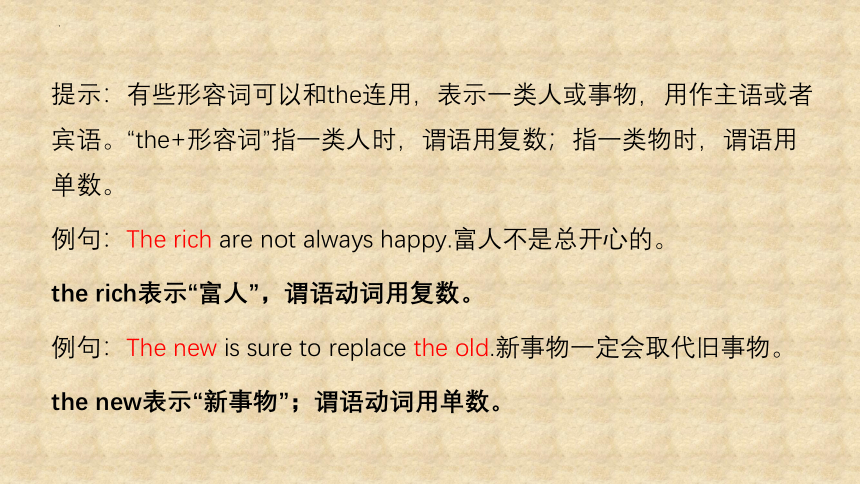
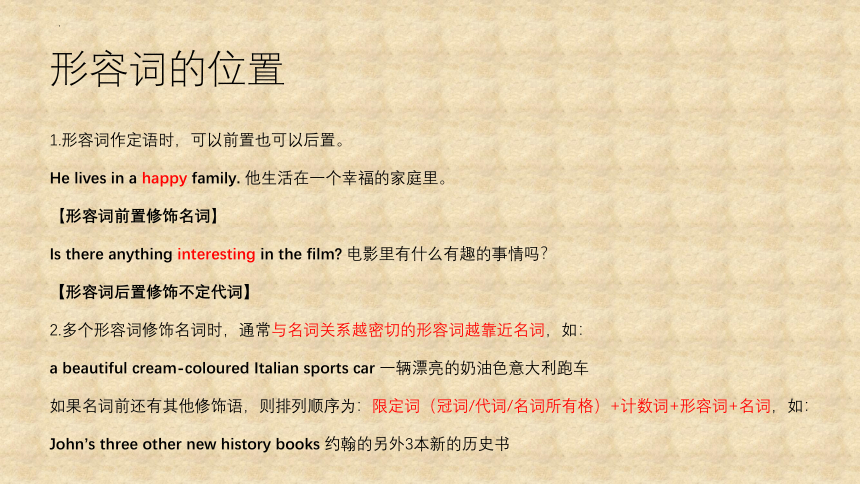
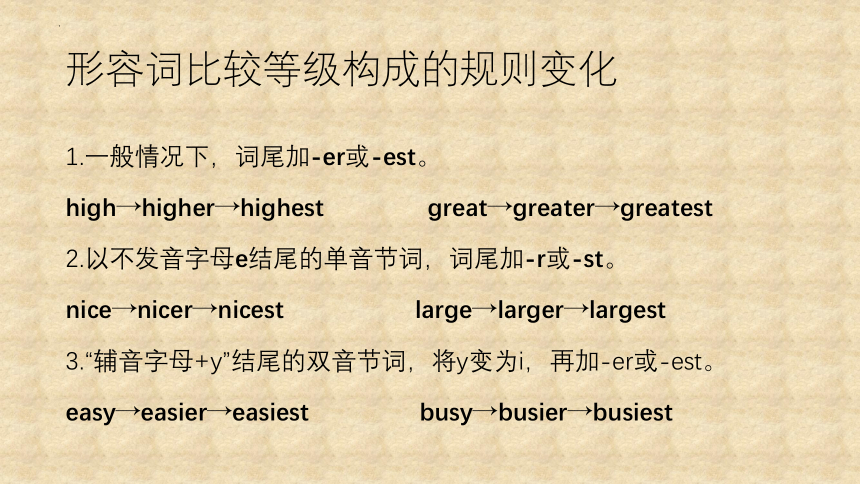
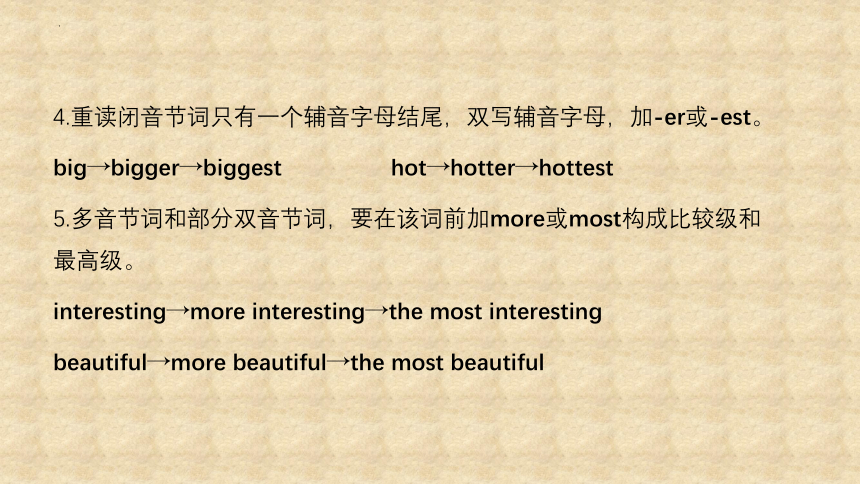
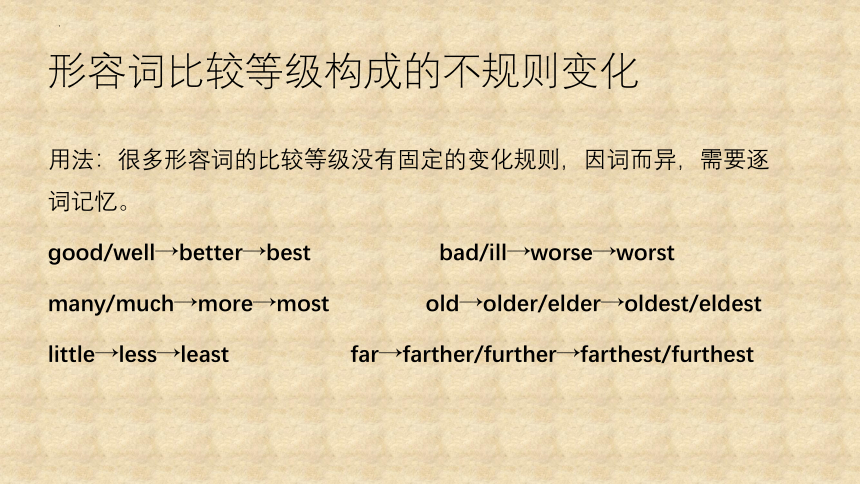


文档简介
(共25张PPT)
4 形容词 adjective
形容词的用法
用法:形容词可作定语、表语、状语、宾语补足语等。
She is a good-looking girl. 她是个漂亮的女孩。
【形容词作定语】
The fish went bad.这条鱼坏了。
【形容词作表语】
He walked in the wind, cold and hungry. 他走在寒风中,又冷又饿。
【形容词作状语,可放在句首、句末或句中】
What she said made him sad. 她的话使他很沮丧。
【形容词作宾语补足语】
提示:有些形容词可以和the连用,表示一类人或事物,用作主语或者宾语。“the+形容词”指一类人时,谓语用复数;指一类物时,谓语用单数。
例句:The rich are not always happy.富人不是总开心的。
the rich表示“富人”,谓语动词用复数。
例句:The new is sure to replace the old.新事物一定会取代旧事物。
the new表示“新事物”;谓语动词用单数。
形容词的位置
1.形容词作定语时,可以前置也可以后置。
He lives in a happy family. 他生活在一个幸福的家庭里。
【形容词前置修饰名词】
Is there anything interesting in the film 电影里有什么有趣的事情吗?
【形容词后置修饰不定代词】
2.多个形容词修饰名词时,通常与名词关系越密切的形容词越靠近名词,如:
a beautiful cream-coloured Italian sports car 一辆漂亮的奶油色意大利跑车
如果名词前还有其他修饰语,则排列顺序为:限定词(冠词/代词/名词所有格)+计数词+形容词+名词,如:
John’s three other new history books 约翰的另外3本新的历史书
形容词比较等级构成的规则变化
1.一般情况下,词尾加-er或-est。
high→higher→highest great→greater→greatest
2.以不发音字母e结尾的单音节词,词尾加-r或-st。
nice→nicer→nicest large→larger→largest
3.“辅音字母+y”结尾的双音节词,将y变为i,再加-er或-est。
easy→easier→easiest busy→busier→busiest
4.重读闭音节词只有一个辅音字母结尾,双写辅音字母,加-er或-est。
big→bigger→biggest hot→hotter→hottest
5.多音节词和部分双音节词,要在该词前加more或most构成比较级和最高级。
interesting→more interesting→the most interesting
beautiful→more beautiful→the most beautiful
形容词比较等级构成的不规则变化
用法:很多形容词的比较等级没有固定的变化规则,因词而异,需要逐词记忆。
good/well→better→best bad/ill→worse→worst
many/much→more→most old→older/elder→oldest/eldest
little→less→least far→farther/further→farthest/furthest
提示:有些形容词有两种比较等级形式,但用法不同,例如:
1. far的两种比较等级形式都可以表示“距离上的远近”。但若要表示“程度上的深远”,就要用further和furthest,如further study。
2. old的比较等级也有两种,elder和eldest指“人的长幼排行”,一般只作定语,如elder sister;而older和oldest可指“人的年龄大小”或“物的古旧”,可作定语、表语, 如She is older than me.
注意:有些形容词没有比较等级。
wrong错误的 right正确的 perfect完美的 excellent极好的
junior年少的 senior年长的 unique独特的 whole整体的
形容词比较等级的用法
1.“A+动词+as+形容词原级+as+B”A和B一样……
My dog is as old as that one.我的狗和那只狗一样大。
2.“……times+as+形容词原级+as……”是……的几倍
This garden is ten times as large as that one.这个花园是那个的10倍大。
3.“A+动词+形容词比较级+than+B”A比B更……
His brother is younger than I.他弟弟比我小。
4.“……times+形容词比较级+than”比……大/长/多几倍
Our room is twice larger than theirs.我们的房间比他们的大两倍。
5.“形容词比较级+and+形容词比较级”越来越……
China is more and more beautiful.中国变得越来越美丽了。
6.“the+形容词比较级……,the+形容词比较级……”越……越……
The sooner, the better.越快越好。
7.“the+形容词比较级……+of the two”两个中较……的
He is the better of the two.他是这两个人中比较好的。
8.“Which is+形容词比较级,A or B ”A和B哪一个较……?
Which is more popular, the radio or the TV 广播和电视哪一个更流行?
9.“A+动词+形容词最高级+of/in……”A是……中最……的
He is the tallest in the class.他是班上个头最高的。
10.“one of the+形容词最高级+复数名词……”是最……之一
One of the most important languages is English.英语是最重要的语言之一。
提示:形容词的比较级前可以用much,a lot,a little,still,far,hardly,no,even,twice,five times等修饰。
例句:Diamond is even harder than steel.钻石比钢还坚硬。
注意:比较级句型中,被比较的双方必须是同一类人或事物。
例句:The dress she bought yesterday is cheaper than yours. 她昨天买的裙子比你的要便宜。
【对比的都是裙子的价格,yours指代裙子,不能用you或your。】
例句:The winter in Beijing is much colder than that in Guangzhou. 北京的冬天要比广州的冷。
【对比的都是天气,that指冬天的天气,不能省略。】
副词 adverb
副词的种类和形式
时间副词:
地点副词:
方式副词:
频率副词:
程度副词:
疑问副词:
其他副词:
now 现在, soon 马上, today 今天…
there 那里,here 这里,home 家里…
hard 努力地,quickly 快速地,slowly 缓慢地…
always 总是,usually 通常,seldom 很少…
very 非常,fairly 相当,much 很…
how 怎样,when 什么时候,where 什么地方…
perhaps 可能,also 也,either 也…
提示:
1. 有些副词可由形容词转化而来,一般在形容词词尾加-ly,如careful→carefully;
词尾为y的形容词,变y为i,再加-ly,如easy→easily。
2. 一些形容词和副词同形的单词,如hard→hard,fast→fast。
3. 有些词兼有两种形式的副词,但它们的含义不同。
(1)close(客观)近/closely(比喻)仔细地
He is sitting close to me. 他坐得离我近。/ Watch him closely. 仔细地观察他。
(2)late晚/lately最近
We often say it is never too late to learn.人们常说活到老学到老。
Do you know what she has been doing lately 你知道她最近在干什么吗?
(3)high(客观)高/highly(比喻)非常,很,高度地
The plane was flying high.飞机在天上飞得高。/ I think highly of your opinion.我认为你的主意很好。
副词的位置
1.时间副词、地点副词、方式副词一般放在句末。
I’ll meet him at the station tomorrow.明天我将去车站接他。【时间副词】
They live here.他们住在这儿。【地点副词】
The boy runs very quickly.这个男孩跑得很快。【方式副词】
2.频率副词一般放在系动词、情态动词、第一个助动词之后,行为动词之前。
She is always kind to us.她总是对我们很好。
I can never forget the day.我永远也不能忘记这一天。
The work has never been done.这项工作永远也做不完。
He often comes late.他经常迟到
3.程度副词修饰动词时,一般放在be动词、情态动词或第一个助动词之后,行为动词之前;修饰形容词、副词时,放在它所修饰的词前面。
I quite like the new bike. 我相当喜欢这辆新自行车。/ I am deeply attracted by him.
The students all work very hard. 所有的学生都努力学习。
4.句末有多个副词连用时,一般顺序:程度副词→方式副词→地点副词→时间副词。
The children are playing games quite happily there now.
孩子们正在那儿很开心地做游戏。
5.疑问副词提问时,放在句首。
When do you get up every day 你每天什么时候起床?
注意:句中有多个时间副词或地点副词连用时,一般把较具体的放在较笼统的之前,表示小的放在表示大的之前。
He was born at 7:30 on the evening of December 2n in 1997.
他出生于1997年12月2日晚上7:30。
提示:enough作副词,常放在所修饰词之后。
He is not old enough to join the army.他没有到参军的年龄。
副词的用法
1.副词主要用来修饰动词、形容词、副词,有时还可修饰整个句子。
Hold tight to the rope, and I will pull you up. 抓紧绳子,我把你拉上来。
【副词修饰动词】
It’s very nice of you. 你真好。
【副词修饰形容词】
Danny read very fast. 丹尼读得非常快。
【副词修饰动副词】
Luckily, John was in when I called. 还好,我打电话过去的时候约翰在。
【副词修饰整个句子】
2.副词在句中可作状语、定语、表语和宾语补足语等。
He works hard. 他努力工作。
【副词作状语】
The villagers there/here are very friendly.那儿/这儿的村民很友好。
【副词作定语,一律后置。】
He is out. 他出去了。
【副词作表语】作表语的副词大多是表示位置的,如in,out,back,up,down,off,away,upstairs等。
I saw him off with my friend two days ago. 两天前,我和我朋友为他送行。
【副词作宾补】
副词比较等级的构成
1.单音节和个别双音节副词,在词尾加-er或者-est构成比较级和最高级;大多数多音节词和部分双音节词,在词前加more,most构成比较级和最高级。
hard→harder→hardest tall→taller→tallest
early→earlier→earliest fast→faster→fastest
beautifully→more beautifully→most beautifully
2.少数副词的比较等级无固定的变化规则,因词而异,需要逐词记忆。
well→better→best badly→worse→worst
little→less→least much→more→most
far→farther/further→farthest/furthest
提示:在英语中,并非所有的副词都有比较级和最高级。表示时间、方位、强调等类型的副词没有比较等级。
completely完全地 totally整体地 hardly几乎不
副词比较等级的用法
1.“A+行为动词+as/so+副词原级+as+B...”A……和B一样……
She speaks English as fluently as you.她说英语像你一样流利。
I can’t speak as/so fast as you.我没法说得像你这么快。
2.“A+行为动词+副词比较级+than+B”A……比B更……
I can run faster than Lucy.我跑得比露西快。
3.“like A better than B”和B比起来,更喜欢A
I like Chinese better than English.和英文比起来,我更喜欢中文。
4.“Which do you like better, A or B ”A和B,你比较喜欢哪一个?
which do you like better, red or blue 红和蓝,你更喜欢哪一个?
5.“A+行为动词+(the)+副词最高级+of/in...”A……是……最……的
He drives fastest in our team.他在我们组开车最快。
Jane danced most elegantly of all the students in the class.
简是班上所有学生中舞姿最优美的。
提示:有些句型中,可用副词的比较级形式表示最高级的含义。
句型为“A+行为动词+副词比较级+than any...+in...”A……是……最……的。
Tom runs faster than anyone else in his team.=Tom runs fastest in his team.
汤姆比他组里其他人跑得都快。
注意:副词比较级转换的常用句型:“比较级←→比较级(反义)”,如
I get up earlier than you.我起得比你早。→You get up later than I. 你起得比我晚。
“比较级←→not as+副词的原级+as...”,如
You sing better than she.你唱得比她好。→She cannot sing as well as you. 她唱得没你好。
Quiz
1. Staying up late makes him look less _____________ than before. (health)
2. It's much ________ to take a plane to your destination. (quick)
3. The ruler is the ___________ of the three. (long)
4. We went __________________ into the woods. (far)
5. We got no __________ information about the forest fire in the area from the Internet. (far)
6. They felt quite _________and looked __________ at the master (angry)
7. In ____________ weather, the old had better stay at home. (freeze)
8. Monday was a ________ day for her. The weather got _________ than weekends and she had the _________ experience of her life. (bad)
healthier
quicker
longest
farther/further
further
angry
angrily
freezing
bad
worse
worst
4 形容词 adjective
形容词的用法
用法:形容词可作定语、表语、状语、宾语补足语等。
She is a good-looking girl. 她是个漂亮的女孩。
【形容词作定语】
The fish went bad.这条鱼坏了。
【形容词作表语】
He walked in the wind, cold and hungry. 他走在寒风中,又冷又饿。
【形容词作状语,可放在句首、句末或句中】
What she said made him sad. 她的话使他很沮丧。
【形容词作宾语补足语】
提示:有些形容词可以和the连用,表示一类人或事物,用作主语或者宾语。“the+形容词”指一类人时,谓语用复数;指一类物时,谓语用单数。
例句:The rich are not always happy.富人不是总开心的。
the rich表示“富人”,谓语动词用复数。
例句:The new is sure to replace the old.新事物一定会取代旧事物。
the new表示“新事物”;谓语动词用单数。
形容词的位置
1.形容词作定语时,可以前置也可以后置。
He lives in a happy family. 他生活在一个幸福的家庭里。
【形容词前置修饰名词】
Is there anything interesting in the film 电影里有什么有趣的事情吗?
【形容词后置修饰不定代词】
2.多个形容词修饰名词时,通常与名词关系越密切的形容词越靠近名词,如:
a beautiful cream-coloured Italian sports car 一辆漂亮的奶油色意大利跑车
如果名词前还有其他修饰语,则排列顺序为:限定词(冠词/代词/名词所有格)+计数词+形容词+名词,如:
John’s three other new history books 约翰的另外3本新的历史书
形容词比较等级构成的规则变化
1.一般情况下,词尾加-er或-est。
high→higher→highest great→greater→greatest
2.以不发音字母e结尾的单音节词,词尾加-r或-st。
nice→nicer→nicest large→larger→largest
3.“辅音字母+y”结尾的双音节词,将y变为i,再加-er或-est。
easy→easier→easiest busy→busier→busiest
4.重读闭音节词只有一个辅音字母结尾,双写辅音字母,加-er或-est。
big→bigger→biggest hot→hotter→hottest
5.多音节词和部分双音节词,要在该词前加more或most构成比较级和最高级。
interesting→more interesting→the most interesting
beautiful→more beautiful→the most beautiful
形容词比较等级构成的不规则变化
用法:很多形容词的比较等级没有固定的变化规则,因词而异,需要逐词记忆。
good/well→better→best bad/ill→worse→worst
many/much→more→most old→older/elder→oldest/eldest
little→less→least far→farther/further→farthest/furthest
提示:有些形容词有两种比较等级形式,但用法不同,例如:
1. far的两种比较等级形式都可以表示“距离上的远近”。但若要表示“程度上的深远”,就要用further和furthest,如further study。
2. old的比较等级也有两种,elder和eldest指“人的长幼排行”,一般只作定语,如elder sister;而older和oldest可指“人的年龄大小”或“物的古旧”,可作定语、表语, 如She is older than me.
注意:有些形容词没有比较等级。
wrong错误的 right正确的 perfect完美的 excellent极好的
junior年少的 senior年长的 unique独特的 whole整体的
形容词比较等级的用法
1.“A+动词+as+形容词原级+as+B”A和B一样……
My dog is as old as that one.我的狗和那只狗一样大。
2.“……times+as+形容词原级+as……”是……的几倍
This garden is ten times as large as that one.这个花园是那个的10倍大。
3.“A+动词+形容词比较级+than+B”A比B更……
His brother is younger than I.他弟弟比我小。
4.“……times+形容词比较级+than”比……大/长/多几倍
Our room is twice larger than theirs.我们的房间比他们的大两倍。
5.“形容词比较级+and+形容词比较级”越来越……
China is more and more beautiful.中国变得越来越美丽了。
6.“the+形容词比较级……,the+形容词比较级……”越……越……
The sooner, the better.越快越好。
7.“the+形容词比较级……+of the two”两个中较……的
He is the better of the two.他是这两个人中比较好的。
8.“Which is+形容词比较级,A or B ”A和B哪一个较……?
Which is more popular, the radio or the TV 广播和电视哪一个更流行?
9.“A+动词+形容词最高级+of/in……”A是……中最……的
He is the tallest in the class.他是班上个头最高的。
10.“one of the+形容词最高级+复数名词……”是最……之一
One of the most important languages is English.英语是最重要的语言之一。
提示:形容词的比较级前可以用much,a lot,a little,still,far,hardly,no,even,twice,five times等修饰。
例句:Diamond is even harder than steel.钻石比钢还坚硬。
注意:比较级句型中,被比较的双方必须是同一类人或事物。
例句:The dress she bought yesterday is cheaper than yours. 她昨天买的裙子比你的要便宜。
【对比的都是裙子的价格,yours指代裙子,不能用you或your。】
例句:The winter in Beijing is much colder than that in Guangzhou. 北京的冬天要比广州的冷。
【对比的都是天气,that指冬天的天气,不能省略。】
副词 adverb
副词的种类和形式
时间副词:
地点副词:
方式副词:
频率副词:
程度副词:
疑问副词:
其他副词:
now 现在, soon 马上, today 今天…
there 那里,here 这里,home 家里…
hard 努力地,quickly 快速地,slowly 缓慢地…
always 总是,usually 通常,seldom 很少…
very 非常,fairly 相当,much 很…
how 怎样,when 什么时候,where 什么地方…
perhaps 可能,also 也,either 也…
提示:
1. 有些副词可由形容词转化而来,一般在形容词词尾加-ly,如careful→carefully;
词尾为y的形容词,变y为i,再加-ly,如easy→easily。
2. 一些形容词和副词同形的单词,如hard→hard,fast→fast。
3. 有些词兼有两种形式的副词,但它们的含义不同。
(1)close(客观)近/closely(比喻)仔细地
He is sitting close to me. 他坐得离我近。/ Watch him closely. 仔细地观察他。
(2)late晚/lately最近
We often say it is never too late to learn.人们常说活到老学到老。
Do you know what she has been doing lately 你知道她最近在干什么吗?
(3)high(客观)高/highly(比喻)非常,很,高度地
The plane was flying high.飞机在天上飞得高。/ I think highly of your opinion.我认为你的主意很好。
副词的位置
1.时间副词、地点副词、方式副词一般放在句末。
I’ll meet him at the station tomorrow.明天我将去车站接他。【时间副词】
They live here.他们住在这儿。【地点副词】
The boy runs very quickly.这个男孩跑得很快。【方式副词】
2.频率副词一般放在系动词、情态动词、第一个助动词之后,行为动词之前。
She is always kind to us.她总是对我们很好。
I can never forget the day.我永远也不能忘记这一天。
The work has never been done.这项工作永远也做不完。
He often comes late.他经常迟到
3.程度副词修饰动词时,一般放在be动词、情态动词或第一个助动词之后,行为动词之前;修饰形容词、副词时,放在它所修饰的词前面。
I quite like the new bike. 我相当喜欢这辆新自行车。/ I am deeply attracted by him.
The students all work very hard. 所有的学生都努力学习。
4.句末有多个副词连用时,一般顺序:程度副词→方式副词→地点副词→时间副词。
The children are playing games quite happily there now.
孩子们正在那儿很开心地做游戏。
5.疑问副词提问时,放在句首。
When do you get up every day 你每天什么时候起床?
注意:句中有多个时间副词或地点副词连用时,一般把较具体的放在较笼统的之前,表示小的放在表示大的之前。
He was born at 7:30 on the evening of December 2n in 1997.
他出生于1997年12月2日晚上7:30。
提示:enough作副词,常放在所修饰词之后。
He is not old enough to join the army.他没有到参军的年龄。
副词的用法
1.副词主要用来修饰动词、形容词、副词,有时还可修饰整个句子。
Hold tight to the rope, and I will pull you up. 抓紧绳子,我把你拉上来。
【副词修饰动词】
It’s very nice of you. 你真好。
【副词修饰形容词】
Danny read very fast. 丹尼读得非常快。
【副词修饰动副词】
Luckily, John was in when I called. 还好,我打电话过去的时候约翰在。
【副词修饰整个句子】
2.副词在句中可作状语、定语、表语和宾语补足语等。
He works hard. 他努力工作。
【副词作状语】
The villagers there/here are very friendly.那儿/这儿的村民很友好。
【副词作定语,一律后置。】
He is out. 他出去了。
【副词作表语】作表语的副词大多是表示位置的,如in,out,back,up,down,off,away,upstairs等。
I saw him off with my friend two days ago. 两天前,我和我朋友为他送行。
【副词作宾补】
副词比较等级的构成
1.单音节和个别双音节副词,在词尾加-er或者-est构成比较级和最高级;大多数多音节词和部分双音节词,在词前加more,most构成比较级和最高级。
hard→harder→hardest tall→taller→tallest
early→earlier→earliest fast→faster→fastest
beautifully→more beautifully→most beautifully
2.少数副词的比较等级无固定的变化规则,因词而异,需要逐词记忆。
well→better→best badly→worse→worst
little→less→least much→more→most
far→farther/further→farthest/furthest
提示:在英语中,并非所有的副词都有比较级和最高级。表示时间、方位、强调等类型的副词没有比较等级。
completely完全地 totally整体地 hardly几乎不
副词比较等级的用法
1.“A+行为动词+as/so+副词原级+as+B...”A……和B一样……
She speaks English as fluently as you.她说英语像你一样流利。
I can’t speak as/so fast as you.我没法说得像你这么快。
2.“A+行为动词+副词比较级+than+B”A……比B更……
I can run faster than Lucy.我跑得比露西快。
3.“like A better than B”和B比起来,更喜欢A
I like Chinese better than English.和英文比起来,我更喜欢中文。
4.“Which do you like better, A or B ”A和B,你比较喜欢哪一个?
which do you like better, red or blue 红和蓝,你更喜欢哪一个?
5.“A+行为动词+(the)+副词最高级+of/in...”A……是……最……的
He drives fastest in our team.他在我们组开车最快。
Jane danced most elegantly of all the students in the class.
简是班上所有学生中舞姿最优美的。
提示:有些句型中,可用副词的比较级形式表示最高级的含义。
句型为“A+行为动词+副词比较级+than any...+in...”A……是……最……的。
Tom runs faster than anyone else in his team.=Tom runs fastest in his team.
汤姆比他组里其他人跑得都快。
注意:副词比较级转换的常用句型:“比较级←→比较级(反义)”,如
I get up earlier than you.我起得比你早。→You get up later than I. 你起得比我晚。
“比较级←→not as+副词的原级+as...”,如
You sing better than she.你唱得比她好。→She cannot sing as well as you. 她唱得没你好。
Quiz
1. Staying up late makes him look less _____________ than before. (health)
2. It's much ________ to take a plane to your destination. (quick)
3. The ruler is the ___________ of the three. (long)
4. We went __________________ into the woods. (far)
5. We got no __________ information about the forest fire in the area from the Internet. (far)
6. They felt quite _________and looked __________ at the master (angry)
7. In ____________ weather, the old had better stay at home. (freeze)
8. Monday was a ________ day for her. The weather got _________ than weekends and she had the _________ experience of her life. (bad)
healthier
quicker
longest
farther/further
further
angry
angrily
freezing
bad
worse
worst
